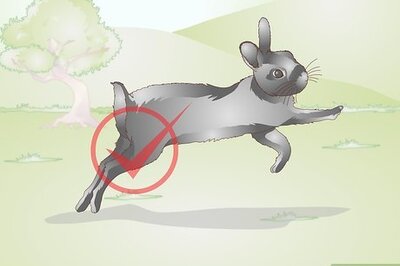
views
The Earth is on fire, quite literally! Traffic signals are melting, runways are shut down, schools are being closed and work hours revised as an extraordinarily hot summer in Europe catches residents off-guard. Some places in Britain recorded temperatures above 40°C, the first time any place in the United Kingdom had breached this mark, while France sizzled at over 45°C, an aberration for the country.
At least 13 people have died in Britain while swimming during a spell of record-breaking hot weather that sparked wildfires, damaged train tracks and triggered warnings that efforts to tackle climate change needed to be stepped up. Europe’s searing heatwave is generating very high levels of harmful ozone pollution, the region’s atmospheric monitoring service has warned, adding that large areas of western Europe also face “extreme” danger of wildfires.
As Europe sizzles, News18 takes a look at the unprecedented weather phenomenon and what it signals for the future:
So, what’s happening?
According to scientists, heatwaves are increasing in frequency and intensity in Europe at a faster rate than almost any other part of the planet.
In what has been dubbed as one of the most significant heatwaves in western Europe in over 200 years, Spain’s prime minister said “more than 500 people died” during a 10-day heatwave as Europe counts the cost of a record period of extreme temperatures.
In France, temperatures of more than 40 degrees Celsius (104 degrees Fahrenheit) over previous days have spelled misery for millions and shattered heat records.
The heatwave saw a new all-time record for Britain where the national weather service clocked 40.3C in eastern England, surpassing the previous high set in 2019. Grassland fires erupted on Tuesday on the edge of London, with one forcing the evacuation of 14 people as farm buildings, houses and garages were consumed by the flames.
Why is this happening?
Climate change is the single biggest factor driving the unusual weather events. According to a NASA analysis, the last eight years have been the hottest ever recorded through direct measurements since the 1880s.
Apart from climate change, a low pressure system over the European region is attracting hot air from northern Africa. An unusual warming in the Arctic Ocean is also behind the sizzling temperatures.
A similar air circulation phenomenon was seen in June as well, when not just France but Norway and many other countries witnessed record high temperatures.
Dry soil is another culprit. If there is less moisture in the soil, which is the case across a large part of Europe, it cannot absorb a lot of heat and hence the temperatures rise quickly.
Hotter, More Frequent Heatwaves
Climate change makes heatwaves hotter and more frequent. This is the case for most land regions, and has been confirmed by the UN’s global panel of climate scientists (IPCC).
Greenhouse gas emissions from human activities have heated the planet by about 1.2 Celsius since pre-industrial times. That warmer baseline means higher temperatures can be reached during extreme heat events.
“Every heatwave that what we are experiencing today has been made hotter and more frequent because of climate change,” said Friederike Otto, a climate scientist at Imperial College London who also co-leads the World Weather Attribution research collaboration.
But other conditions affect heatwaves too. In Europe, atmospheric circulation is an important factor. A study in the journal Nature this month found that heatwaves in Europe have increased three-to-four times faster than in other northern mid-latitudes such as the United States. The authors linked this to changes in the jet stream – a fast west-to-east air current in the northern hemisphere.
Things Will Get Worse
The global average temperature is around 1.2C warmer than in pre-industrial times. That is already driving extreme heat events.
“On average on land, heat extremes that would have happened once every 10 years without human influence on the climate are now three times more frequent,” said ETH Zurich climate scientist Sonia Seneviratne to Reuters.
Temperatures will only cease rising if humans stop adding greenhouse gases to the atmosphere. Until then, heatwaves are set to worsen. A failure to tackle climate change would see heat extremes escalate even more dangerously.
Countries agreed under the global 2015 Paris Agreement to cut emissions fast enough to limit global warming to 2°C and aim for 1.5°C, to avoid its most dangerous impacts. Current policies would not cut emissions fast enough to meet either goal.
A heatwave that occurred once per decade in the pre-industrial era would happen 4.1 times a decade at 1.5°C of warming, and 5.6 times at 2°C, the IPCC says. Letting warming pass 1.5°C means that most years “will be affected by hot extremes in the future,” Seneviratne said.
Grim Forecast
Heatwaves like the one stifling western Europe are becoming more frequent and the trend is set to continue until at least the 2060s, the United Nations said.
The current heatwave should act as a wake-up call for countries pumping ever more carbon dioxide into the atmosphere, the UN’s World Meteorological Organization said.
“They are becoming more frequent and this negative trend will continue… at least until the 2060s, independent of our success in climate mitigation efforts,” WMO chief Petteri Taalas told a press conference in Geneva.
“Thanks to climate change we have started breaking records… In the future these kinds of heatwaves are going to be normal, and we will see even stronger extremes,” he added.
(With inputs from agencies)
Read all the Latest News, Breaking News, watch Top Videos and Live TV here.




















Comments
0 comment